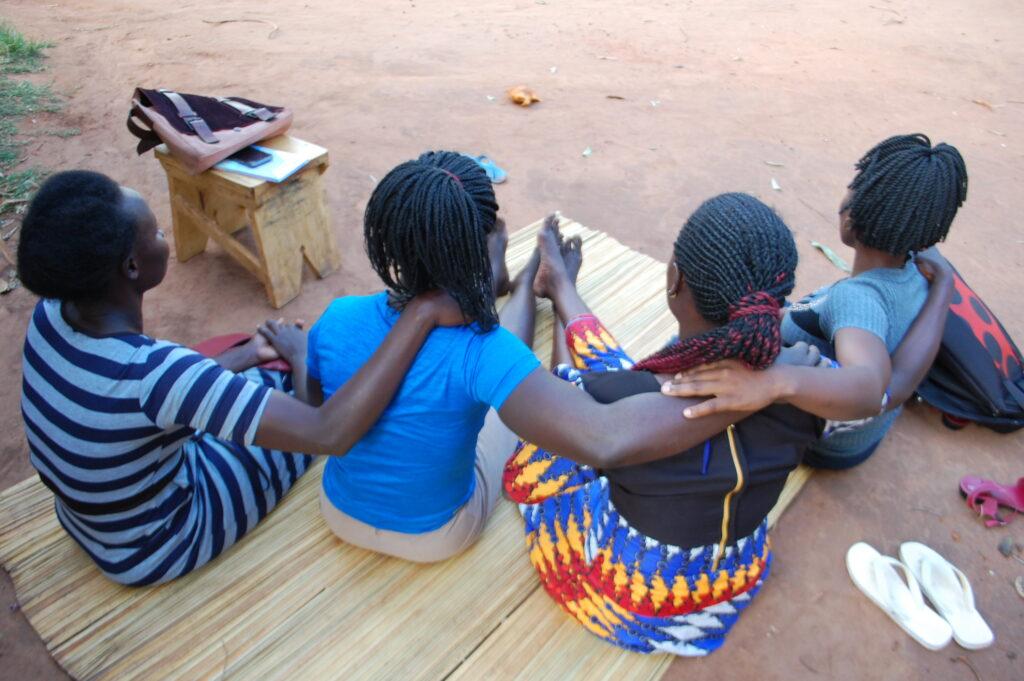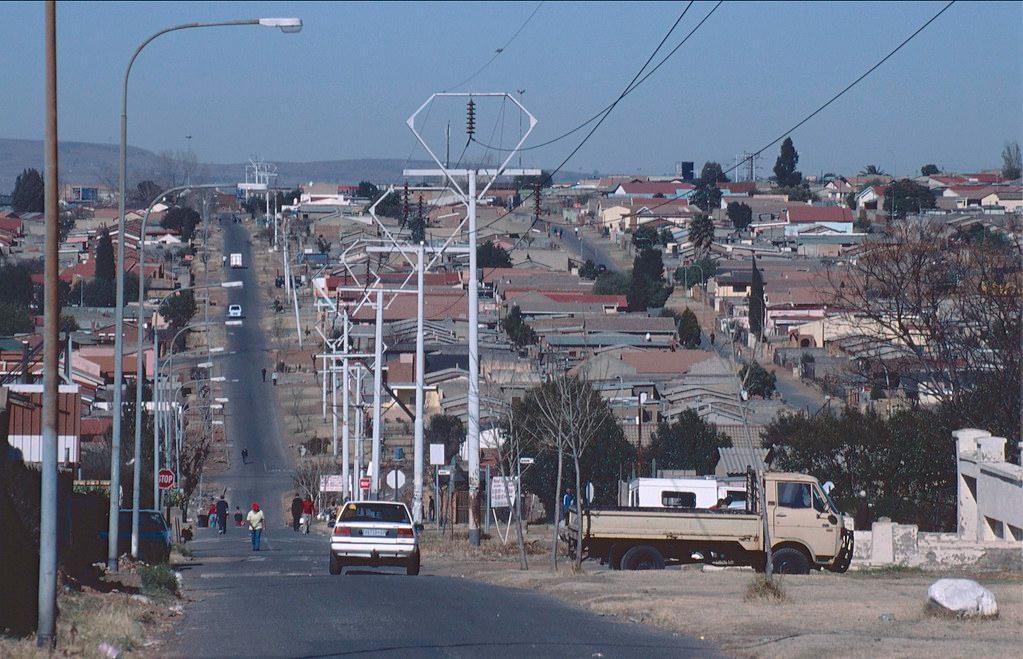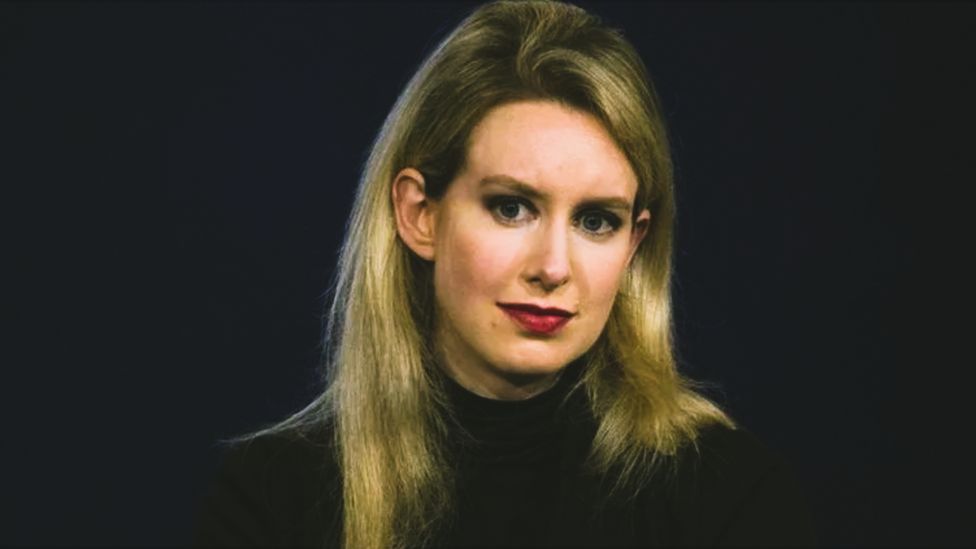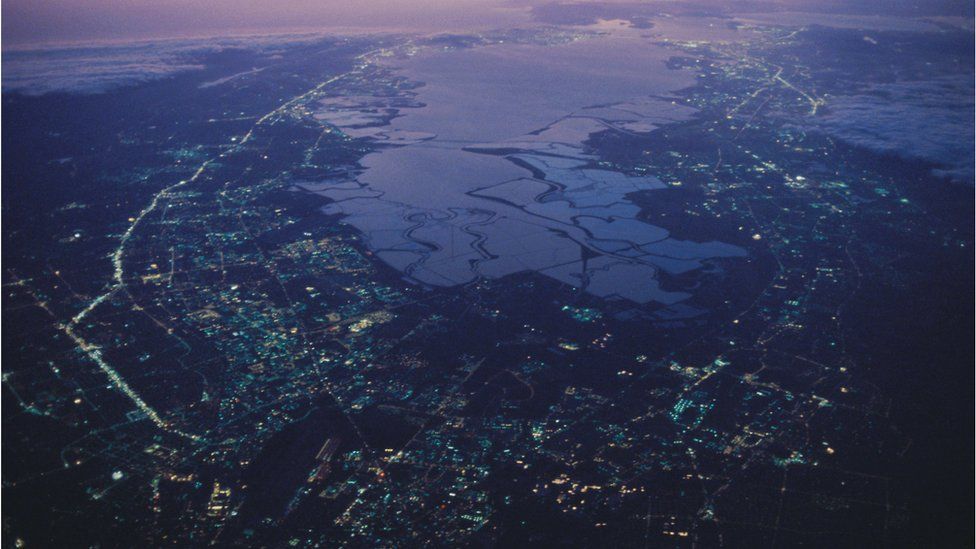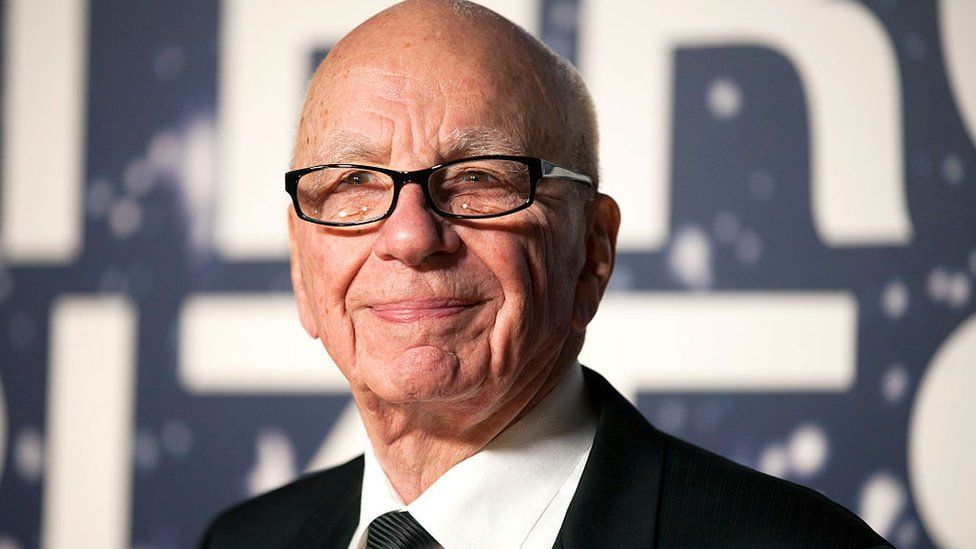Meet some of the activists fighting to live and love in Namibia.
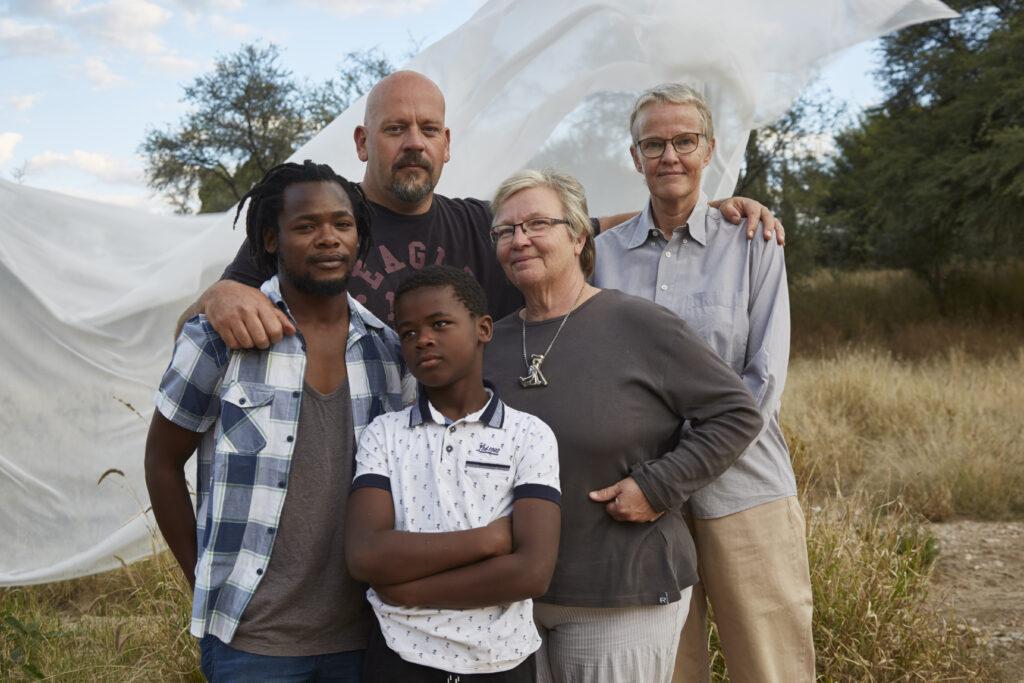
From left to right: Daniel Digashu, Johann Potgieter, Anita Seiler-Lilles and Anette Seiler, with Daniel and Johann’s son Lucas in front. All photographs by Chris de Beer-Procter.
This year, a growing rumble of LGBTQ rights activism in Namibia has escalated into an impressive array of legal actions. In 2021 alone, there have been at least ten cases brought to the country’s courts by same-sex couples seeking marriage equality, trans activists and victims of homophobic violence, and queer families fighting for their rights to live together. This year too, the cabinet considered abolishing Namibia’s “sodomy” law, a seldom enforced colonial-era provision that criminalises sex between men.
These developments could be monumental for a country in which state-sanctioned homophobia has continued since its hard-won independence in 1990. Despite the liberation movement turned ruling party SWAPO promising equality for all, Namibia’s recent political history is littered with homophobic comments by prominent politicians and LGBTQ Namibians do not enjoy full legal rights. They are not protected from discrimination, they do not have the right to marry, and their marriages in other countries are not recognised. Some popular responses to recent legal cases also highlight the extent to which homophobia is still common in much of society.
It is this status quo that the Namibians are challenging in the courts and through other interventions. Here are some of those activists, sharing their experiences of fighting for queer rights in their own words.

“When we opened the case, we had no idea it was so much bigger than us.”
South African Daniel Digashu (left) and his Namibian husband Johann Potgieter (right) are suing the government to have their marriage, convened in South Africa, recognised by the state in Namibia. After years of waiting, their landmark case was heard on 19 May 2021. They await the judgement. As told by Daniel:
“We decided to move to Johann’s homeland so that we could spend time with his family, we wanted our kid to know his side of the family, his grandparents. When we initially spoke to officials at the Ministry of Home Affairs, we were told not to open pandora’s box by applying for permanent residence because our marriage is not recognised. Instead, we applied for my work permit so that I could at least run the company I own with Johann.
When the work permit was rejected, we were so frustrated because we went to them, we put our cards on the table. We were transparent. When our appeal was also rejected, we didn’t really have a choice but to sue. We had uprooted our lives, our home, our son, our dogs. Our kid was already in school. We didn’t have a choice. Whether they believe it or not, we are a family unit. I was not just going to go back to RSA because they rejected my visa.
When we opened the case, we had no idea that it was so much bigger than just us. Personally, my two boys are just such rocks. I couldn’t have stayed this long had it not been for them. That keeps me going, that and knowing how many more people are fighting for exactly what we’re fighting for.”
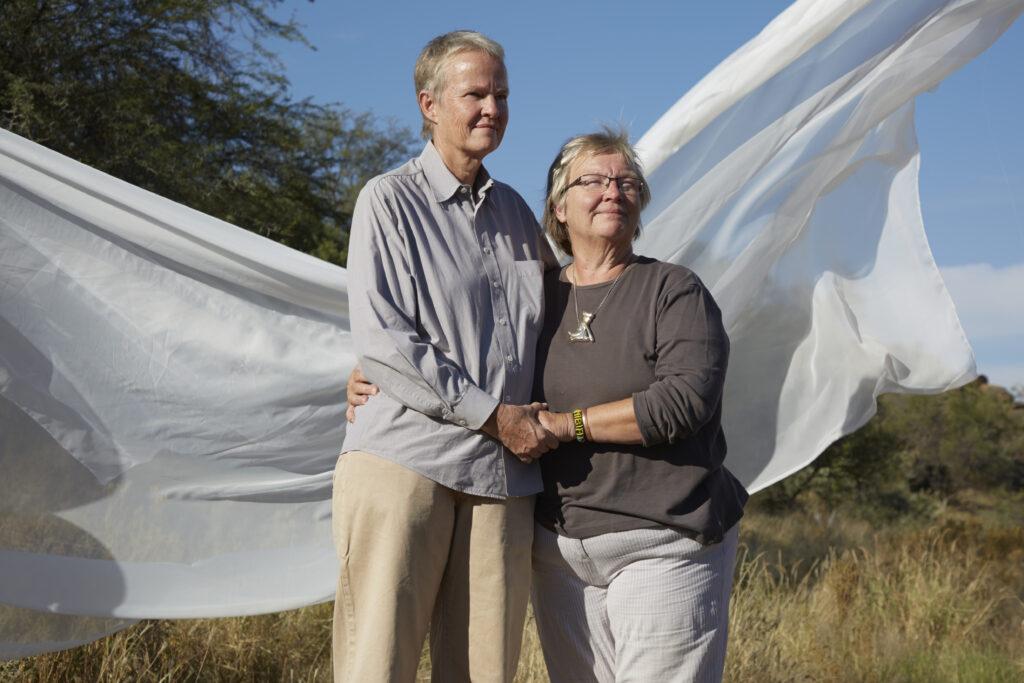
“We….are normal people who fall in love with people from our own sex. That is the only difference”
Anette Seiler (left), who is Namibian, and Anita Seiler-Lilles (right), who is German, planned to relocate and retire in Annette’s homeland. Although she fulfils all criteria in the Immigration Act, the Ministry of Home Affairs and Immigration rejected Anita’s application for permanent residence because it does not recognise their German same-sex marriage. As told by Anette:
“There are honestly so many more interesting activities we imagined pursuing in our retirement, rather than being in court fighting the Ministry of Home Affairs and Immigration. On the one hand, we feel that we are in the right. But, on the other hand, we fear that the judges might decide against us. It’s not a sure win. For example, when we have spoken to government employees about our case, they openly trampled on our dignity. It’s incredibly distressing. We have a lot to lose.
We are not only fighting for Anita’s right to live in Namibia. Should we lose, we must both leave Namibia. I am a Namibian, who then would have to live in exile just because I love a woman.
Every time we get an invoice from our lawyer, we are shocked. This case is so expensive, we hope we have enough money to fight until the end. This money is our life savings. We planned on saving it for our retirement and for our travels, not for legal fees.
We, the gays and lesbians living in Namibia, are normal people who fall in love with people from our own sex. That is the only difference to heterosexuals. In every other sense we are like all other people. We laugh, we cry, we work and eat and sleep. Sometimes we are sad, sometimes we are happy. We are creative and interested in many things. Most of the time our sexuality is not even in the forefront of our minds.
In the coat of arms of Namibia, it says ‘Unity. Liberty. Justice’. But, as long as there is no liberty for gays and lesbians to be who they are, as long as there is no justice for us because of our sexuality, there will be no unity.”

“It’s hard to have your existence marginalised, to be told that you don’t belong.”
Omar van Reenen is a co-founder of Namibia Equal Rights Movement and a civil rights activist.
“What I do is inspired by my grandfather. He built the first hotel for coloured [people] in Namibia, during apartheid. It was a place of activism, community, a safe space. I grew up with that story and I felt like the universe sent me here to fight for social justice in the same way that my grandfather did.
Like racial justice was the civil rights issue of my parent’s generation, LGBTQ rights is the civil rights issue of our time. And it’s disheartening to see that the government doesn’t take this issue seriously.
It’s hard to see the government misusing my constitution to invalidate my human dignity. It’s hard to have your existence marginalised, to be told that you don’t belong. It’s hard to be called sick, demonic, satanic. It’s hard that you can’t walk up to a business and say ‘listen, I’ve got a bright future ahead of me, please hire me’ knowing that if they find out who you are, they might ostracise you. It’s hard not to be able to walk into a healthcare centre without fearing discrimination. It’s hard knowing that I can’t marry the person that I love in my country because there’s no recognition of my love.
It’s hard to talk about my personal stuff because I always try to put other people first. But I will say that it does take a mental toll because you don’t only have to stand up and fight against an oppressive regime, there’s a lot of internalised homophobia in our communities. It’s exhausting going to bed at night, fighting this fight but it’s a good exhaustion. It’s good to feel tired fighting for social justice, because fighting for what’s right, is always worth it. I wake up the next day and I think ‘new day, new fight’.”

“I always imagined activists to be angry people with posters”
Mercedez von Cloete is a media personality and human rights advocate who is suing the Ministry of Safety and Security for transphobic violence she suffered at the hands of police in 2017. The trial hearing concluded on 16 May 2021. She is awaiting the verdict.
“A few years ago, I had a very traumatic experience with the Namibian Police, where I was unlawfully detained and brutally assaulted, repeatedly. This was not the first time that something like this had happened to me, but I promised myself that I could not allow it to persist. And so, for the last four and a half years I’ve been trying to get justice and hold the police accountable.
I always imagined activists to be angry people with posters, shouting and protesting on the streets. As someone who is in no way confrontational, it didn’t look anything like me. I’ve since learned that leaving injustices unchecked is an injustice in and of itself. That’s what made me realise that activists are really just people who no longer accept the things they ‘cannot change’ but instead seek to change the things they cannot accept.
Just like how we need the intelligence and courage to look past complexion and see the community to eliminate racism, I feel we need to look past gender and genitalia or who and how we love to live in a just, accepting and equal society.
I now consider myself an advocate for change, for all the trans and gender diverse people who don’t have the agency or support to ensure their rights are upheld. Or who are denied certain fundamental services, rights, protections and freedoms because of who they are. For those who experience continual harassment and police brutality, something which has remained unaddressed for far too long.
Personally, the emotional, psychological and physiological (dis)stress cannot be quantified. I’m still healing and just hoping that in November when the final judgement is made, that justice will prevail.”
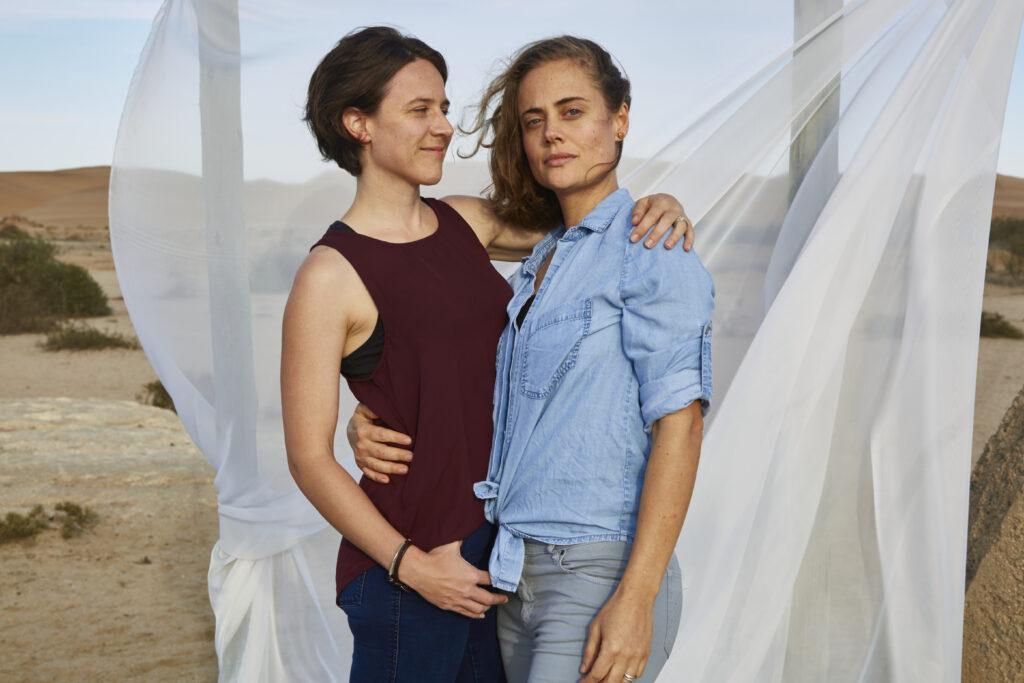
“It’s no longer just about my own rights, it’s about our rights.”
Pascale du Toit-Henke (left) and her South African wife Jennifer du Toit-Henke (right) are suing the Namibian government for their constitutional right to live and work in Namibia, Pascale’s homeland. As told by Jennifer.
“I would say I’m an unlikely activist. I’d never considered myself to be someone on the forefront and pushing back on social issues. While I have always believed in righteousness, being an activist has never been central to my identity. Putting a legal challenge to the state and potentially launching ourselves into the spotlight on a very controversial issue…it’s very daunting.
Pascale and I didn’t even have the luxury to ready ourselves for this. We were pretty much forced to because the Ministry of Home Affairs wanted to kick me out of the country knowing that I wouldn’t be able to get back in. Back to my wife and our home.
It’s hard coming from a country like South Africa where we have wonderful LGBTQ rights. It was a shock for me. I didn’t realise that I’d never really felt discriminated against before, this felt like the first time I’ve really experienced homophobia. It’s not a good feeling. It makes you sad, angry, resentful. It chips away at you.
Mostly it’s the unspoken discrimination, the laws that have been put down by the Ministry of Home Affairs which has caused us an invisible distress. It’s made me feel very unwelcomed and embattled. It’s hard to shake off. The state-sanctioned homophobia has caused me to lose a lot. I’ve lost my right to work, to travel home or to continue my business. It’s so stressful and surreal.
Going to court feels a little bit confrontational and so, so unnecessary. And yet, so necessary. And so, it’s felt like I’ve been guided down this path to becoming an activist, or maybe initially forced down it. It’s no longer just about my own rights, it’s about our rights.”

“What propels me to be at the forefront is that I know myself.”
Ndiilokelwa Nthengwe is an intersectional gender justice activist involved in advocacy and communications for several organisations including Equal Namibia. Their first book, The Chronicles of a Non-Binary Black Lesbian Namibian…in Love, is now available for pre-order.
“I’m trying to document and narrate what a nonbinary lesbian experience in Namibia could be. I’m doing this for myself, too. If I had the book I’ve written when I was in high school, I wonder how would it have shaped my own reflections of my identity. It would have confirmed for me all the thoughts I had and the internal conflict I felt. At that time, I didn’t have the language to articulate who I am: what I am for myself, to myself. And if media like it could exist, then it’s not just for me. It’s for the other many people who struggle to articulate exactly what they feel, to help them navigate how to exist.
This work documenting and archiving the struggle, like we in these social movements are doing by live-tweeting from the court rooms and doing Instagram live and radio interviews, is so important. We must do it for ourselves, we need to centre the voices of marginalised groups. It’s important because someone is always watching. Out of the 10,000 that are homophobic, maybe 300 appreciate the content you put out and they inform themselves on issues that affect their identities.
Being at the forefront is a privilege but it’s also humbling. It’s not about leading people, it’s about giving them the authority to become a part of the movement. It’s about showing up. What propels me to be at the forefront is that I know myself. I know my leadership qualities. When you say you’re going to do something, you must do it. You must be accountable to yourself. No one is going to do that for you just because you’re a lesbian or you’re gay. You must show that you’re not here to play. It means doing the internal work for yourself first.”

“Nobody is voiceless. We all have voices. We just have to find ways to use those voices.”
Deyoncé Cleopatra Chaniqua Naris is a Namibian-born trans woman, blogger and podcast host. She is the executive director of the Transgender, Intersex and Androgynous Movement of Namibia (TIAMON) and the chairperson of the Southern African Trans Forum. She is affectionately known as “Mam D” to her “little Queers of the world”.
“Oh my goodness, Namibia is a beautiful country. It’s a warm country, the people are amazing. As queer people, we actually live relatively comfortable lives depending on where you find yourself on the socio-economic spectrum. I always say to comrades, in comparison to other countries in Africa, I believe as queer Namibians we are a lot better off and we should value that. But we also know that there is systematic exclusion and discrimination for our community here. Some of it is backed by individuals with personal prejudices that work at governmental institutions or who are custodians of our constitution. Therefore, our access to services like healthcare, judicial or just economic justice is generally a problem.
I’ve been an activist since I was a child, a mere little bambino. I can remember as early as my school days, I think I became the bully of the bullies, which is never a good thing. But, I’ve always stood up for the underdog, for what people would define as persons who are voiceless, but I mean, nobody is voiceless. We all have voices. We just have to find ways to use those voices.
But as a transwoman and activist in Namibia, my face is constantly out there. I find myself constantly navigating my own safety. Once your face is blasted all over, you never really feel safe because the level of transphobia and the abuse that you encounter which increases just a little. Its emotionally daunting living like this. It’s overwhelming to constantly prepare myself to leave the house because for the verbal abuse that I face, for the amount of taxis that will drive past me because I’m a transgender woman. They think it’s taboo or that it’s illegal for me to be me, they leave me by the roadside. It is hard but you manage to find ways to exist.”
